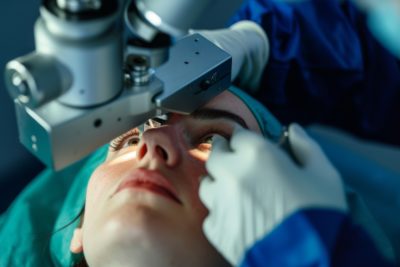Key Takeaways
- LASIK surgery is an increasingly popular method of correcting nearsightedness and farsightedness.
- Blurry vision after LASIK is part of the healing process for most individuals.
- Most patients notice initial improvement in their vision within the first week after LASIK, but some still report blurry vision for some time following the procedure.
- Individual eye healing responses, individual’s pre-existing eye conditions, and patient compliance with care instructions all play a significant role in the recovery process after LASIK surgery.
- Selecting a reputable clinic as well as adhering to post-operative care instructions is vital to having a successful LASIK surgical recovery.
In recent years, LASIK (Laser-Assisted In Situ Keratomileusis) eye surgery has emerged as a revolutionary solution for individuals seeking freedom from glasses and contact lenses. This procedure has gained immense popularity due to its quick and effective nature, with patients often experiencing improved vision almost immediately. However, it’s essential to understand that the road to visual clarity after LASIK may involve a brief period of blurry vision. In this blog, we’ll explore why this blurring occurs and how long it typically lasts.
Blurry Vision After Lasik Eye Surgery?
Blurriness after LASIK is a common occurrence and is typically part of the normal healing process. During the procedure, a laser is used to reshape the cornea, correcting refractive errors such as nearsightedness, farsightedness, and astigmatism. As the cornea heals and adjusts to its new shape, vision may initially be blurry.
What is the Immediate Postoperative Period After Lasik?
Immediately after LASIK surgery, patients are often advised to rest and avoid strenuous activities. While some individuals may experience improved vision right away, others may notice a degree of haziness or blurriness. This is normal and usually temporary.
The First Few Hours to Days
In the hours and days following LASIK, patients may encounter fluctuations in vision, with some experiencing intermittent blurriness. This is a result of the cornea adapting to its new configuration and any potential swelling or dryness. Eye drops prescribed by your LASIK surgeon can help alleviate discomfort and expedite the healing process.
The First Week
During the first week post-LASIK, most patients will notice a significant improvement in their vision. However, it’s common for some blurriness or haziness to persist, especially when reading or focusing on close objects. This is a natural part of the healing process and should gradually improve over the coming weeks.
Beyond the First Week
While the majority of blurriness subsides within the first week, it’s not uncommon for residual symptoms to linger for a few weeks or even months. The extent and duration of post-LASIK blurriness can vary from person to person, depending on factors such as individual healing patterns, the severity of the refractive error, and adherence to post-operative care instructions.
What Factors Are Affecting Recovery of Blurriness After LASIK?
Several factors can influence the duration and severity of post-LASIK blurriness. These include
-
Individual Healing Response:
Each person’s body responds differently to surgery, affecting the rate at which the cornea heals.
-
Pre-Existing Eye Conditions:
Individuals with certain pre-existing eye conditions may experience a more prolonged recovery period.
-
Post-Operative Care:
Strict adherence to the prescribed post-operative care regimen, including the use of prescribed eye drops and avoiding activities that may strain the eyes, is crucial for a smooth recovery.
-
Severity of Refractive Error:
The extent to which the cornea is reshaped during LASIK can impact the duration of blurriness. More significant corrections may involve a slightly longer recovery period.
-
Age:
Younger individuals often experience quicker healing and adaptation to the new corneal shape than older patients.
Hence, blurry vision after LASIK is a common and temporary side effect of the healing process. While many patients enjoy improved vision almost immediately, others may experience fluctuations and haziness for a brief period.
Choosing a reputable LASIK eye surgery centre and following post-operative care instructions diligently are crucial steps to ensure a smooth and successful recovery. If you’re considering LASIK, consult with experienced eye care professionals or visit Dr Agarwlas Eye Hospital to discuss your individual needs, expectations, and potential outcomes. Remember that patience is key, and the majority of patients ultimately achieve the clear vision they desire through this life-changing procedure. Contact 9594924026 | 080-48193411 to book an appointment for your eye check up.









